Crafting a Chemist Resume With a Keen Eye for Remote or Hybrid Positions
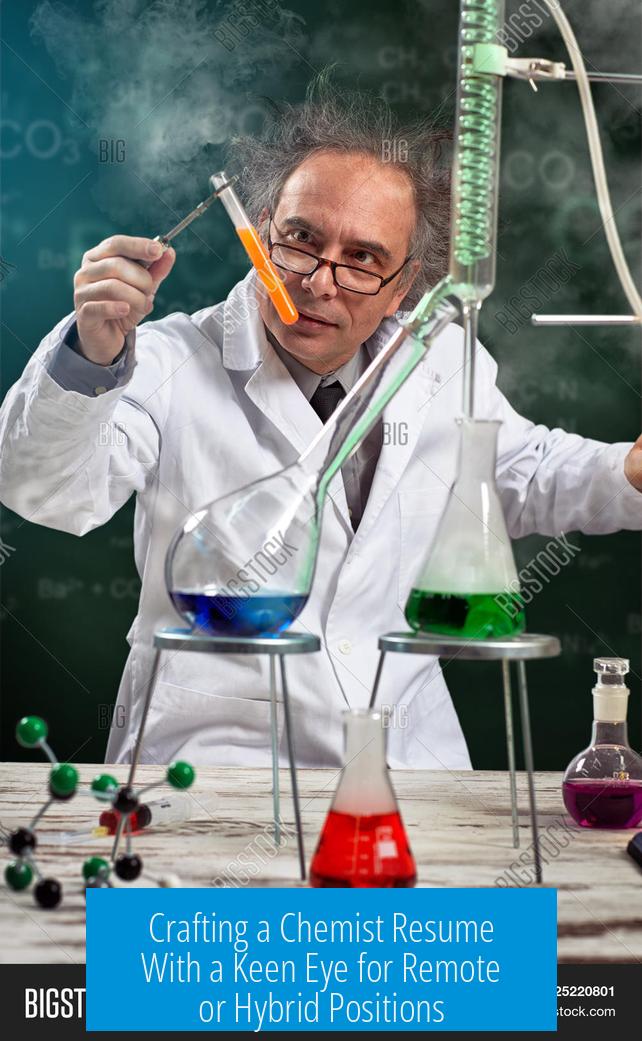
A good chemist resume focuses on relevant skills, consistent formatting, and clear representation of experience, particularly when targeting remote or hybrid roles, which remain rare and competitive.
Resume Content and Essential Formatting
Start by removing the career objective from the resume. It often offers little value and wastes space. If needed, explain your goals in a cover letter instead.
Simplify the education section. Include only your degree-granting institution and graduation year. Avoid sharing your GPA unless it’s above 3.5, as lower scores might weaken your presentation.
In the work experience part, emphasize the specific techniques, instruments, and equipment you’ve used. Details about analytical methods, quality control procedures, or laboratory instrumentation matter most. Avoid vague descriptions. Instead of stating “quality control experience,” specify methods like HPLC, GC-MS, or titration techniques.
Keep language factual and direct. Replace adjectives with clear accomplishments and technical expertise. For instance, rather than “excellent lab skills,” say “performed quantitative analysis using UV-Vis spectroscopy.”
Formatting details reflect your attention to precision, crucial in chemistry. Ensure date ranges, headings, and bullet points align consistently. Small touches like subtle color highlights for subheadings can improve readability without distracting.
To fill white space freed by removing excess sections, include interests or certifications such as OSHA training or waste management coursework. If you have programming skills, list languages like Python or MATLAB, highlighting potential uses in data analysis or process automation.
Optimizing Resume for Applicant Tracking Systems
Most companies use software to scan resumes for keywords. Tailor each submission by carefully matching your resume terms with those from the job listing. This improves chances of passing initial filters.
Challenges in Finding Remote or Hybrid Chemistry Jobs
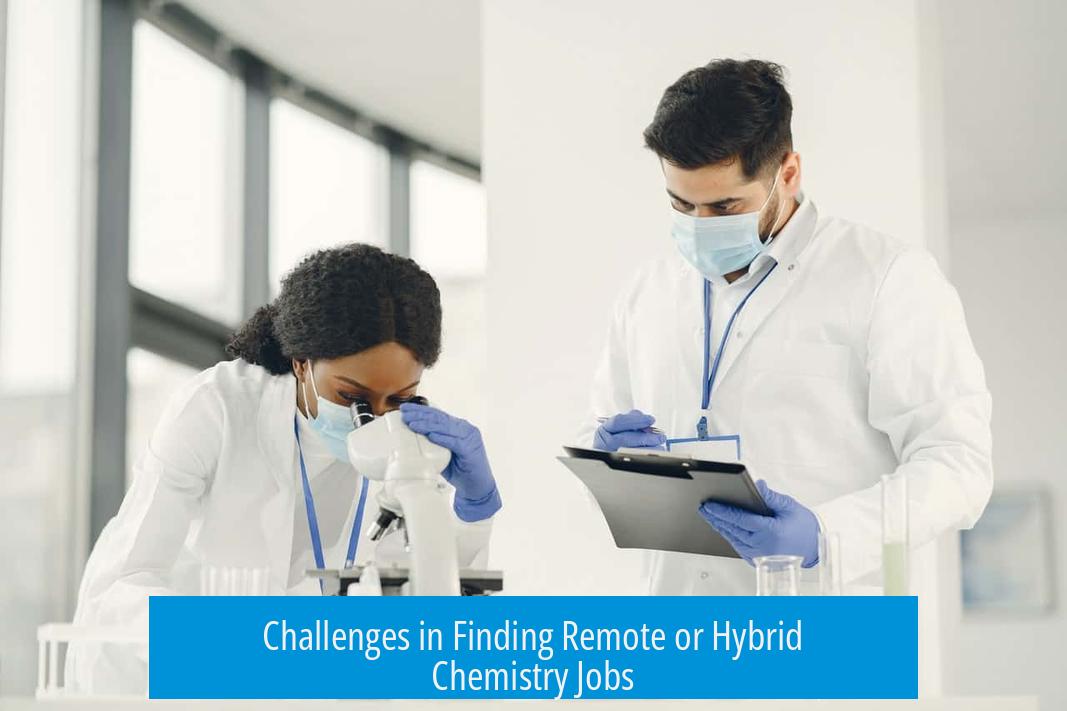
The nature of chemistry work limits remote options. Laboratory tasks generally require physical presence. Entry-level chemists rarely find remote or hybrid roles. Many industry experts confirm this reality, noting that roles involving bench work almost always demand on-site attendance.
Hybrid positions remain scarce and generally reserved for senior roles or functions centered on data analysis and programming rather than hands-on lab work.
Alternative Career Paths for Remote Work
If remote or hybrid work is a priority, consider roles connected to chemistry that require less lab time. Examples include:
- Technical support for chemical products or laboratory instruments
- Quality assurance and data analysis positions
- Regulatory affairs or product compliance roles
- Application scientist or sales engineer roles within instrumentation companies
- Public service or nonprofit organizations with more flexible working policies
These positions often allow some remote flexibility and leverage chemistry knowledge without bench duties.
Advice for Early Career Chemists
Fresh graduates should accurately represent their experience. Overstating skills from short internships or part-time work risks undermining credibility during interviews. Prepare to explain methodologies and demonstrate practical understanding of key laboratory instruments.
Networking remains vital. Contacting lab managers or connections informally before submitting a resume can improve your chances. Express genuine interest, and be ready to discuss how your skills match their needs.
Key Takeaways

- Remove career objectives; focus on skills and relevant experience.
- Streamline education; omit GPA unless highly competitive.
- Detail specific techniques and instrumentation in work experience.
- Maintain consistent formatting; attention to detail matters.
- Tailor resumes for applicant tracking software by using job listing keywords.
- Entry-level remote/hybrid chemist roles are very rare due to lab demands.
- Explore allied remote roles in support, regulatory, or data analysis.
- Be honest and prepared for questions about your lab skills in interviews.
- Use networking strategically to discover opportunities before applying.
Does Anybody Have a Keen Eye for a Good Chemist Resume? Navigating Your Fresh Start and Remote Work Dreams
So, you just finished college, dipped your toes into the working world, and then—bam!—laid off because slow business waved its gloomy flag. And now, you’re dreaming of a remote or hybrid chemist gig. Understandable, because hey, sitting in a lab or office five days a week? Not the move, lol. But before you dive into the wild job market, let’s break down what makes a good chemist resume and the harsh truths about remote chemistry positions. Spoiler alert: chemistry and remote work are like oil and water, but there are ways around it.
The Basics: What Makes a Chemist Resume Actually Work?
First things first: your resume is your personal billboard, shouting to hiring managers, “Hey, I’m worth your time!” But it’s easy to get trapped in cliché traps or clutter—so let’s cut the fluff.
- Career Objective? Skip It. This one’s a hot debate, but most experts agree that the career objective is outdated—like floppy disks. Hiring managers want to see what you’ve done and what skills you bring, not vague dreams. Keep your ambitions for the cover letter where they belong.
- Education Should be Lean and Mean. List only your degree-awarding institution and graduation year. Got a GPA under 3.5? Lose it. No need to clutter your resume with filler that doesn’t wow.
- Work Experience Must Be Specific. Don’t just say “worked in quality control.” Name the methods—HPLC, GC-MS, UV-Vis spectroscopy? Did you analyze pesticides or pharmaceuticals? Precise details kill generic impressions.
- Skills and Certifications Count Big. Got OSHA card? Waste management training? Coding skills in Python or MATLAB? Flash these because they say, “I know the rules and can work smart.”
Oh, and pay attention to formatting because, spoiler alert, chemists obsess over details. Alignment, spacing, consistent fonts—all should be as flawless as your titration curves.
Remote Work in Chemistry? Here’s the Reality Check, Straight Up

Dreaming of swapping your lab coat for pajama pants and a home office? Think twice. Chemistry is a hands-on career; your job literally involves mixing chemicals and analyzing samples in labs—home chemistry sets don’t quite cut it for employers.
- Remote Jobs for Chemists Are Rare. Like, unicorn rare. Fresh grads searching for those positions often find only crickets. It might take 5-10 years of grinding before your role offers even partial remote work.
- Lab Presence is a Must. Bench chemistry requires physical presence, so even hybrid jobs mean trips to the lab. Managers honestly hesitate to hire remote chemists because troubleshooting delays hurt progress.
- Programming and Data Analysis Could Help. Learning to write scripts in Python or use JMP lets you tackle data remotely. But the core lab work? No escape.
Spoiler Alert: Alternative Remote Opportunities Related to Chemistry
If a strictly lab-free option appeals, don’t despair. Chemistry opens alternative gateways:
- Technical Support Roles. Picture answering detailed questions from chemists worldwide about reagents or techniques while chilling at home. It’s niche, but real.
- Regulatory or Supply Chain Roles. Tracking chemical products, ensuring compliance, or managing inventory—these jobs often have remote flexibility.
- QA and Data Analysis. Some quality assurance or data analyst roles can offer hybrid models. These hinge on your ability to crunch and interpret data rather than mix chemicals daily.
- Application Scientist or Sales Engineer. Big instrument manufacturers hire people who understand both the tech and science but prefer occasional travel over daily lab visits.
- Public Service and Nonprofits. Some sweet spots in the public sector offer hybrid models and a sense of mission.
Tips for Fresh College Graduates: Making Your Resume Shine and Job Search Smarter
Landing a job as a fresh chemist is a marathon, not a sprint. It’s tempting to list every lab session or project to wow recruiters, but hiring managers sniff out overstatements quickly.
“I’d ask what makes your lab skills ‘superior,’” says a seasoned manager. “Be ready to describe basic instrument methods after calling yourself an expert.”
So, keep your resume grounded.
- Be Specific, Not Sweeping. Instead of “handled laboratory tasks,” say “operated GC-MS to analyze volatile compounds, reducing errors by 15%.”
- Network Like You Mean It. Find lab managers or industry pros on LinkedIn or local events. Impress them with curiosity before pitching your resume.
- Tailor Your Resume for Each Application. Job application software scans for keywords. Scrutinize job posts and mirror their language—you want your resume to pass the tech gatekeeper, then win hearts.
Shaping Your Resume’s Look: Formatting That Screams ‘I’m Detail-Oriented!’
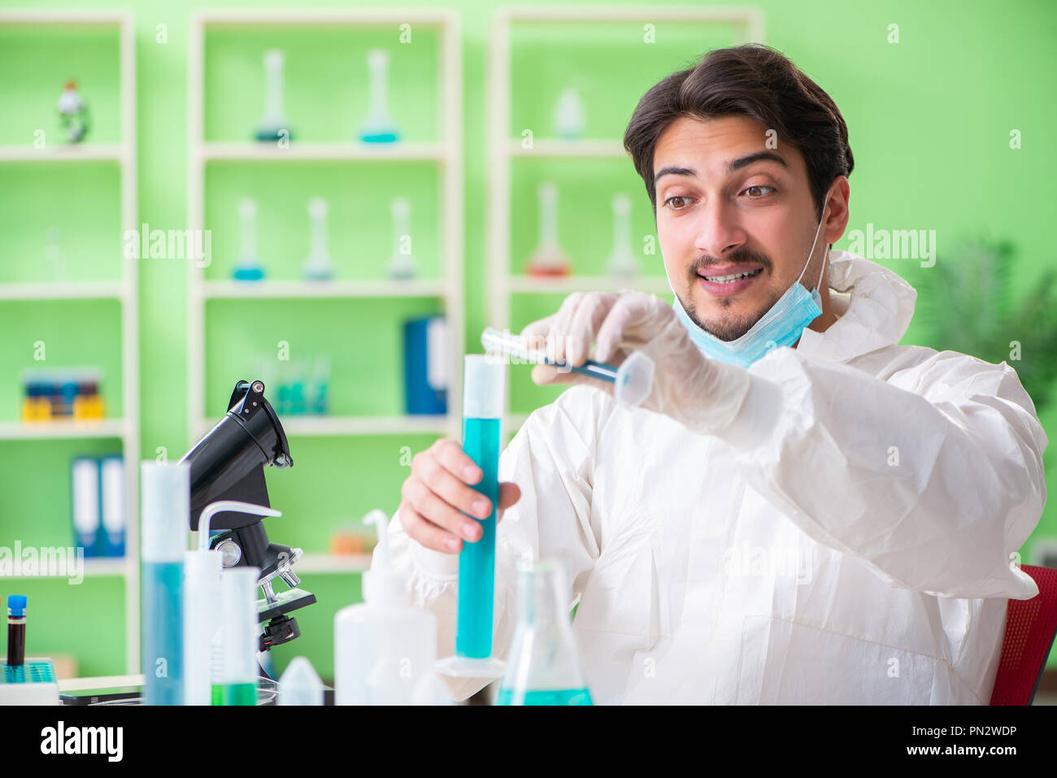
Remember, chemistry is about precision. Your resume format tells a story without words:
- Align dates and sections perfectly. Crooked timelines look like sloppy lab techniques.
- Use subtle color—like a touch of dark blue on subheadings—to break the monotony and keep readers engaged.
- Include a small “Interests” section to humanize yourself. Maybe hiking, coding side projects, or sudoku puzzles to show you analyze problems beyond chemistry.
How Don’t Let Remote Work Dreams Crumble—Pivot Smartly
Here’s the deal: if remote chemistry sounds ideal, you may suffer frustration pursuing typical lab roles remotely. However, branching into roles stretched around chemistry can fulfill your remote or hybrid hopes.
Ever thought about bolstering your credentials with a PhD? It tends to open doors into research management—where remote work might be more feasible. Plus, the pay bump isn’t half bad.
Meanwhile, prioritize climbing the chemistry ladder through robust skills and certifications. For example, mastering programming languages like Python can automate data, save time, and increase your value, even for traditional lab jobs.
A Real Example: Jessica’s Journey
Jessica, a fresh chemist, wanted remote work from the jump. She cut the career objective, streamlined her education to “BSc Chemistry, 2023,” and dropped GPA details after some advice. She highlighted instrumental expertise with instruments like HPLC and spectrophotometers, added OSHA training, plus Python scripting to automate data parsing.
Jessica quickly noticed the dilemma: remote bench roles don’t exist at entry level. She pivoted towards regulatory affairs and landed a hybrid role at a nonprofit. Now she works mostly from home, attends lab days 2x weekly, and feels like she’s winning the modern chemist life.
Final Thoughts: The Humble (But Empowered) Chemist’s Resume & Job Hunt
Does anybody have a keen eye for a good Chemist resume? Yes, and it begins with ruthless editing, specific skills, and realistic expectations about remote work.
Your resume isn’t a magic wand, but a tool. Polish it to showcase your skills, drop antiquated sections, tailor it for each role, and include certifications that scream professionalism.
Remember: chemistry jobs usually need you physically present, but nearby roles related to chemistry can offer flexibility and growth.
So, ready to update that resume and embrace your chemistry future? Keep it precise, be adaptable, and who knows—you might just find a hybrid role that works for your lifestyle without the dreaded 9-to-5 lab grind.
Want to geek out about resumes or remote chemistry roles? Reach out, share your experiences, and let’s talk shop. Because the chemistry job market isn’t just about molecules—it’s about connections, clarity, and crafting yourself a role that fits.
What key details should I highlight on my chemist resume to catch a hiring manager’s eye?
Focus on specific analytical techniques and instruments you used. Detail your relevant lab skills clearly. Avoid vague phrases and remove your GPA if it’s under 3.5. Show your equipment training and any safety certifications.
How important is formatting and consistency in a chemist resume?
Very important. Hiring managers look for attention to detail, especially in chemistry roles. Keep spacing consistent and align dates properly. Use subtle elements like color for subheadings to improve readability.
Can I realistically find a fully remote chemist position as a recent graduate?
Remote chemist jobs are rare, especially entry-level. Most lab roles require on-site presence. Consider remote roles related to chemistry like technical support, regulatory work, or data analysis instead.
What alternative career paths in chemistry offer more remote or hybrid flexibility?
Look into product regulatory jobs, supply chain roles, or technical support. Sales engineer or application scientist roles at instrument companies may offer hybrid work with some travel. Public service jobs sometimes allow hybrid work.
How should I prepare for interviews to validate my lab skills?
Be ready to explain your hands-on experience and the methodology behind instruments you’ve used. Hiring managers often probe whether you truly performed the tasks you list. Prepare clear, fact-based examples of your competencies.


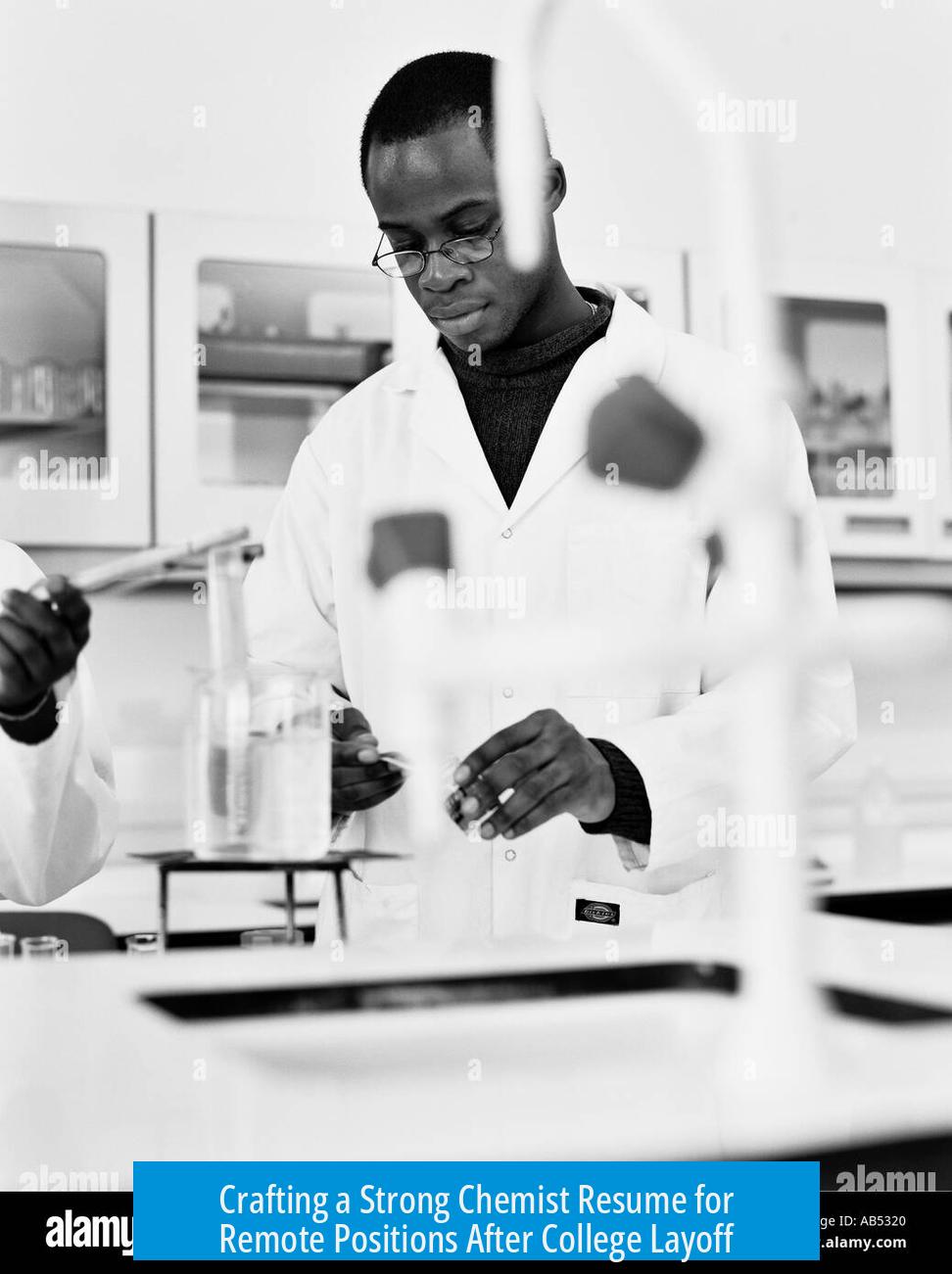
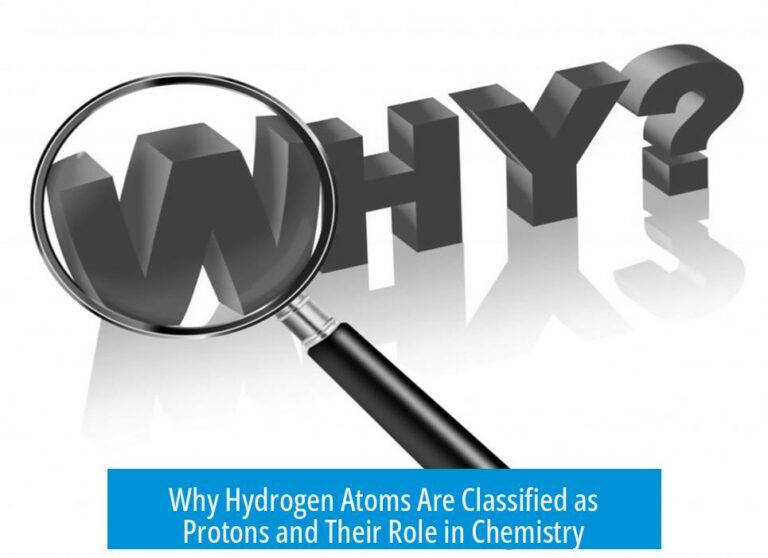
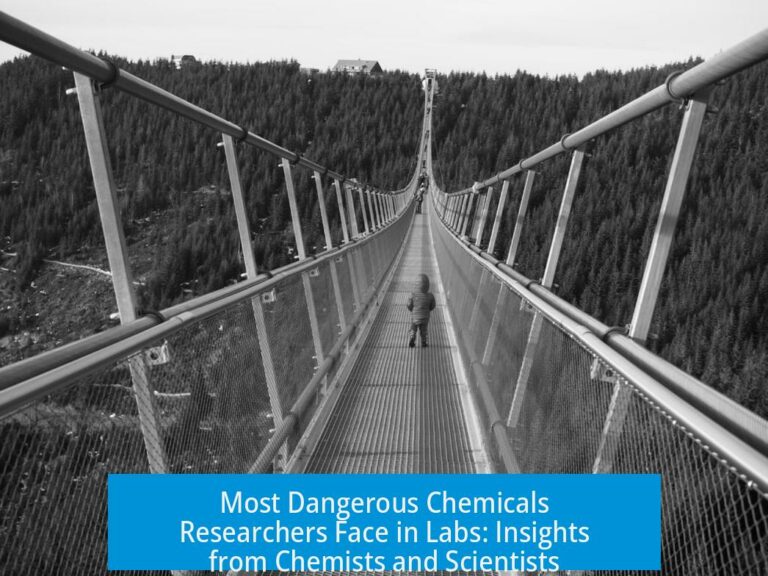
Leave a Comment